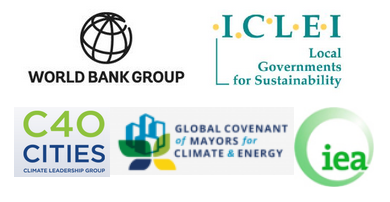ICLEI-Local Governments for Sustainability and local level actors have highlighted commitments by cities around the world to advance climate action.
To help cities reduce carbon emissions and improve urban livelihoods, the World Bank, C40 Cities, the Compact of Mayors and other partners launched a data-driven planning tool to help cities identify and prioritize climate-smart actions.
These commitments have taken place in advance of the Third UN Conference on Housing and Sustainable Urban Development (Habitat III), which is expected to adopt a New Urban Agenda, and the 22nd session of the Conference of the Parties (COP 22) to the UN Framework Convention on Climate Change (UNFCCC).
 4 October 2016: ICLEI-Local Governments for Sustainability and local level actors have highlighted commitments by cities around the world to advance climate action. To help cities reduce carbon emissions and improve urban livelihoods, the World Bank, C40 Cities, the Compact of Mayors and other partners launched a data-driven planning tool to help cities identify and prioritize climate-smart actions. These commitments have taken place in advance of the Third UN Conference on Housing and Sustainable Urban Development (Habitat III), which is expected to adopt a New Urban Agenda, and the 22nd session of the Conference of the Parties (COP 22) to the UN Framework Convention on Climate Change (UNFCCC).
4 October 2016: ICLEI-Local Governments for Sustainability and local level actors have highlighted commitments by cities around the world to advance climate action. To help cities reduce carbon emissions and improve urban livelihoods, the World Bank, C40 Cities, the Compact of Mayors and other partners launched a data-driven planning tool to help cities identify and prioritize climate-smart actions. These commitments have taken place in advance of the Third UN Conference on Housing and Sustainable Urban Development (Habitat III), which is expected to adopt a New Urban Agenda, and the 22nd session of the Conference of the Parties (COP 22) to the UN Framework Convention on Climate Change (UNFCCC).
African regions, cities and towns highlighted their role in implementing the Sustainable Development Goals (SDGs), the global climate agenda and the New Urban Agenda in the Cotonou Declaration. The Declaration is the outcome of the ‘Preparatory Forum of African Local and Regional Councilors,’ which the United Cities and Local Governments of Africa organized in advance of COP 22 as the main preparation for African local and regional authorities. The Declaration further: encourages all African countries to ratify the Paris Agreement on climate change; calls for the Green Climate Fund (GCF) to establish a dedicated funding stream for local and regional governments; and calls on local governments in Africa to join the Global Covenant of Mayors for Climate and Energy. The Forum took place from 8-10 September in Cotonou, Benin.
Also on local climate action, 27 cities in Argentina committed to the Compact of Mayors in September 2016, joining over 550 cities globally that have committed to reduce local greenhouse gas (GHG) emissions, enhance resilience to climate change and track their progress. These commitments follow an effort by ICLEI Local Governments for Sustainability South America and the Network of Argentinian Cities on Climate Change (RAMCC) to promote the Compact of Mayors throughout Argentina and mobilize commitments from mayors. The commitment to publicly track progress is a key component of the Compact of Mayors, which aims to promote a link between local and global reporting to build a robust dataset on city contributions to national and global climate goals. The Compact of Mayors and the European Covenant of Mayors are merging to become the Global Covenant of Mayors for Climate and Energy.
In another example of local climate action, Reykjavík City, Iceland’s capital, committed to become carbon neutral by 2040. Reykjavík Mayor, Dagur Eggertsson, stressed city’s key role in fighting climate change, observing cities “can react quickly and have many possibilities of enacting change.” He said Reykjavík plans to increase bicycle and bus use as the primary means of transportation, which is the city’s main source of GHG emissions. Reykjavík produces its electricity with hydroelectric power and heats its houses through geothermal heating, according to its Climate Action Plan.
On cities and energy, the International Energy Agency (IEA) highlighted cities’ role in energy transitions, noting that urban areas account for 64% of global primary energy use and produce 70% of global carbon dioxide emissions. IEA’s ‘Energy Technology Perspective 2016’ (ETP 2016) recommends options for improving urban energy efficiency and reducing urban emissions, with suggestions ranging from encouraging walking, cycling and public transit to cities adopting, monitoring and enforcing building energy codes for new construction. ETP 2016 showcases over 2,000 actions by cities around the world that are implementing projects to decrease energy use and increase renewable power, urging immediate action to avoid locking in inefficient choices.
The World Bank and partners launched ‘CURB: Climate Action for Urban Sustainability.’ The tool aims to help users estimate the cost, feasibility and impact of climate actions, such as improving transport system efficiency or retrofitting buildings, under different scenarios. CURB also allows city officials to use proxy data from peer cities or countries, enabling cities with limited or missing data to take advantage of existing, comparable data. Over 100 cities around the world are using or planning to use CURB, which is a free, Excel-based tool. The World Bank and its partners launched CURB during Climate Week NYC. [ICLEI Press Release] [ICLEI Press Release on Argentina] [ICLEI Press Release on Reykjavík] [Reykjavík Plan] [Global Covenant of Mayors for Climate and Energy Website] [IEA Press Release] [ETP Website] [World Bank Feature Story] [CURB Website] [IISD RS Story on NY Climate Week]